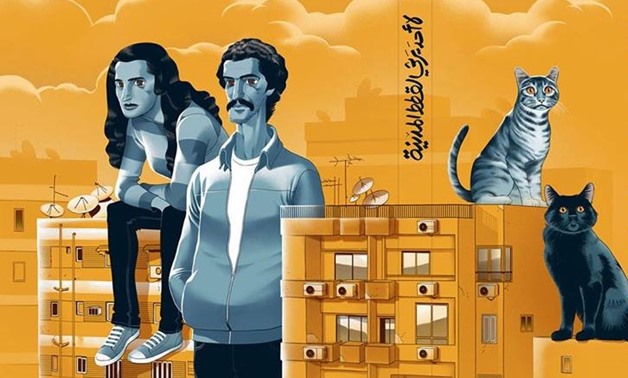
Fragment from “No One Cares about city Cats” book cover -Photo courtesy of the event's official Facebook page
CAIRO – 3 April 2018: NVIC (Netherlands-Flemish Institute in Cairo) hosted two Egyptian authors, Ahmed Naji and Muhammad el-Hajj who discussed his recent book “No One Cares about City Cats,” on Thursday.
“No One Cares about City Cats” is a group of six stories about love. The six stories revolve around relationships that are coming to an end, or ended already.
The book was published by “Dar El Tanweer” (House of Lightening) Publishing House as a grant. The grant facilitated working on the project as he was not obliged to worry about the financial means of the project, which helped the author write.
The discussion was the last event in a series of lectures, discussions and seminars held by the NVIC. The series sought to create an intellectual platform that tackled different topics through inviting writers, photographers, filmmakers, historians and other lecturers with varied professional backgrounds.
Muhammad el-Hajj is an actor and writer, known for his role in Villa 69 that also starred prominent Egyptian actor, Khaled Abol Naga. Ahmed Naji is an Egyptian novelist and the author of the famous novel “The Use of Life”.
“It is as if I sailed with a boat in the “Love River” due to the simple attractive language used by Hajj in the book,” Naji commented on the book
Creating a fruitful discussion, Naji pointed out specific questions to Hajj through a two way discussion between Hajj and audiences who were able to know certain aspects of the book.
.
Starting the discussion with a powerful question, Naji asked Hajj; “Isn’t it boring to present six whole stories about love in one book?" Hajj pointed out that love is an issue that can be tackled and viewed through endless perspectives.
Hajj also mentioned that he preferred to portray his thoughts and experiences about love in six separate stories to avoid the difficulty of linking between the sequence of events happening throughout the whole book.
He added that the book is a tool by which he delivers to the readers his own personal experiences. In his book, Cairo was a common location among the six stories where All events take place in famous districts in Cairo such as Maadi and Downtown, among others.
Despite being a script writer, Hajj found more freedom in the world of literature than in cinema; however in 2010 he was willing to turn one of the six love stories into a short film, but the project didn’t work out due to production and directing obstacles.
Many of the attendees who read the book agreed that through the six love stories, Hajj succeeded to break many stereotypical concepts that the Egyptian community has about women and men in relationships.
In all of the stories he insisted on referring to the January 25 revolution as “The 18 Days of Anger”, an expression that brings many significant memories that he has experienced during that time.
Naji and Hajj agree on one philosophical approach used in building the dramatic structure of the six stories in the book which is inspired by a famous French philosopher called Alain Badiou who believed that all plays, novels, and love stories should crafted with challenges and dramatic problems.

Comments
Leave a Comment